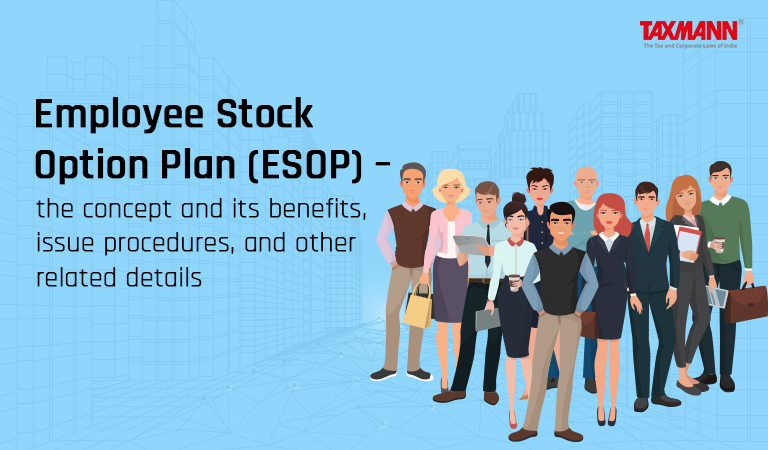Employee Stock Option Plan (ESOP) – the concept and its benefits, issue procedures, and other related details
- Blog|News|Company Law|
- 2 Min Read
- By Taxmann
- |
- Last Updated on 8 September, 2021

[2021] 130 taxmann.com 88 (Article)
Employee Stock Option Plan (ESOP) –meaning
1. Employee stock option plan simply means a system by which companies could allow its employees to purchase the company’s shares. Some of the foreign holding companies also provide the employees of an Indian subsidiary with such an option in certain cases. Under the employee stock option plan, the employees are granted options, which allows the employee to buy the stock at a rate below the prevailing market price/value of the stock, or the employee is provided a certain percentage of his/her remuneration in stocks of the company.
The employee stock option plan is of a contractual nature which gives employees the right, but not the obligation, to purchase or subscribe to a specified number of shares of the company at a fixed price, that is, the exercise price. The exercise price remains fixed even if the market price goes up in the future.
Reason for providing ESOP by companies
2. Many of the start-up companies are not in a position to afford to provide large compensation packages to their employees at the initial stage and hence the start-ups prefer to offer an employee stock option plan to their employees. When the employee stock option plan is offered to the employees, the employer gets the employee vested in the interests of the company and provides the employee with a sense of ownership, which in turn, motivates the employee to perform a task with an actual vested interest in the company, being a part-owner.
Some of the companies provide the employee stock option plan which could be exercised on a future date in order to provide an incentive for a long-term commitment from the employee to the company.
Benefits available to an employer (company) by providing ESOPs
3. The following are the benefits for the company by providing an employee stock option plan to its employees.
1. Acquiring the shares of a departing owner: The owners of private companies could use the employee stock option plan to sell their shares. Companies are allowed to make tax-deductible contributions to the employee stock option plan to buy out the shares or the company could use the employee stock option plan to borrow money to buy the shares.
2. Borrowing money at a lower after-tax cost: Cash borrowed under the employee stock option plan is used to buy the company’s shares and shares of existing owners. Contributions to the employee stock option plan are tax-deductible as they are made to repay the loan amount. Both principal and interest are tax-deductible.
3. Creates an employee benefit: A company could issue treasury shares or new shares to an employee stock option plan and deduct the value from the taxable income. Companies sometimes contribute cash to the employee stock option plan to buy shares from existing public or private owners. In public companies, employee stock option plans are often used in conjunction with the employee savings plan. Rather than matching the employee’s savings through cash, the employers can match the employee’s savings through stocks from an employee stock option plan, and usually, the employers will match the savings at a higher level through stocks.
Click Here to Read the Full Article
Disclaimer: The content/information published on the website is only for general information of the user and shall not be construed as legal advice. While the Taxmann has exercised reasonable efforts to ensure the veracity of information/content published, Taxmann shall be under no liability in any manner whatsoever for incorrect information, if any.

Taxmann Publications has a dedicated in-house Research & Editorial Team. This team consists of a team of Chartered Accountants, Company Secretaries, and Lawyers. This team works under the guidance and supervision of editor-in-chief Mr Rakesh Bhargava.
The Research and Editorial Team is responsible for developing reliable and accurate content for the readers. The team follows the six-sigma approach to achieve the benchmark of zero error in its publications and research platforms. The team ensures that the following publication guidelines are thoroughly followed while developing the content:
- The statutory material is obtained only from the authorized and reliable sources
- All the latest developments in the judicial and legislative fields are covered
- Prepare the analytical write-ups on current, controversial, and important issues to help the readers to understand the concept and its implications
- Every content published by Taxmann is complete, accurate and lucid
- All evidence-based statements are supported with proper reference to Section, Circular No., Notification No. or citations
- The golden rules of grammar, style and consistency are thoroughly followed
- Font and size that’s easy to read and remain consistent across all imprint and digital publications are applied



 CA | CS | CMA
CA | CS | CMA
